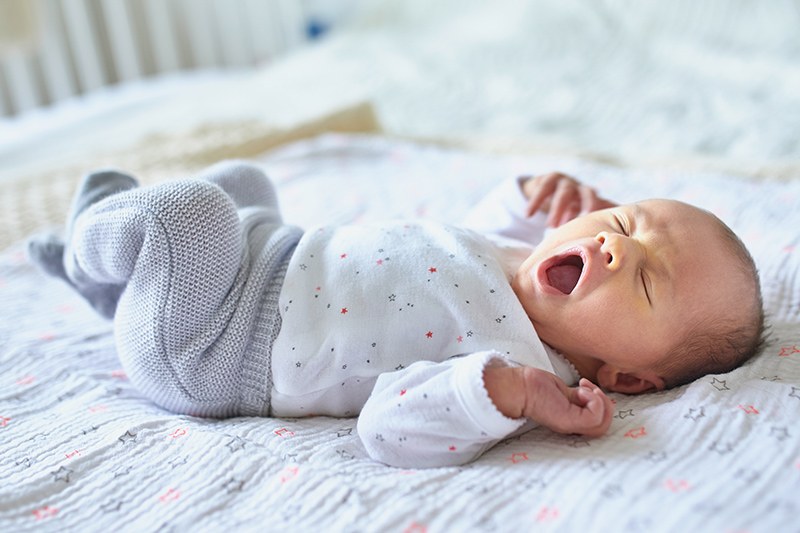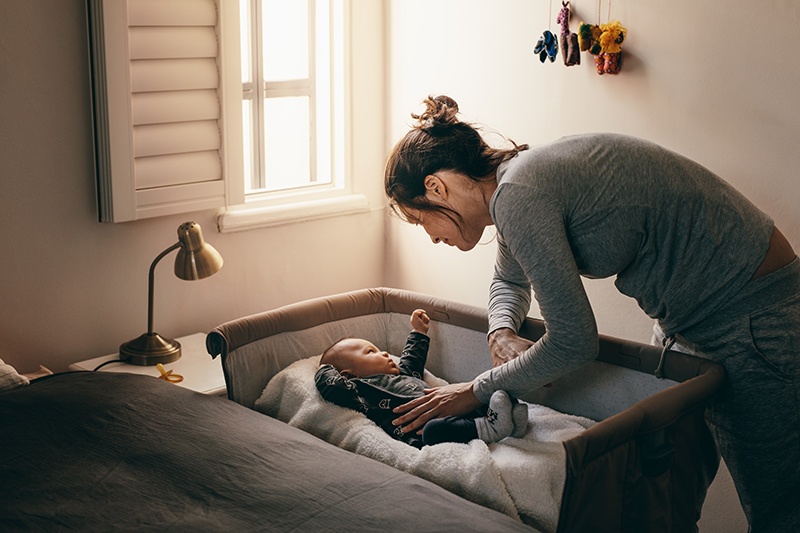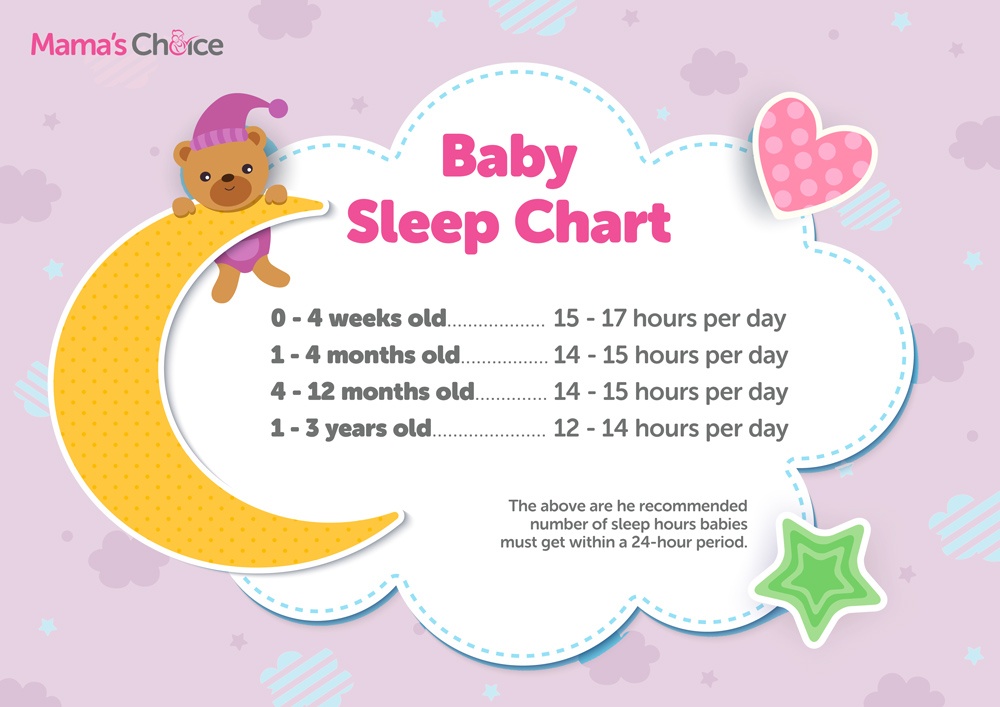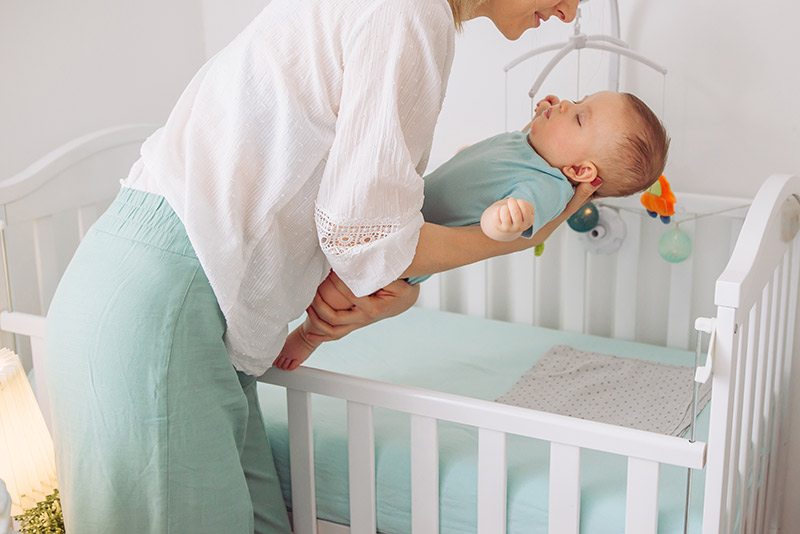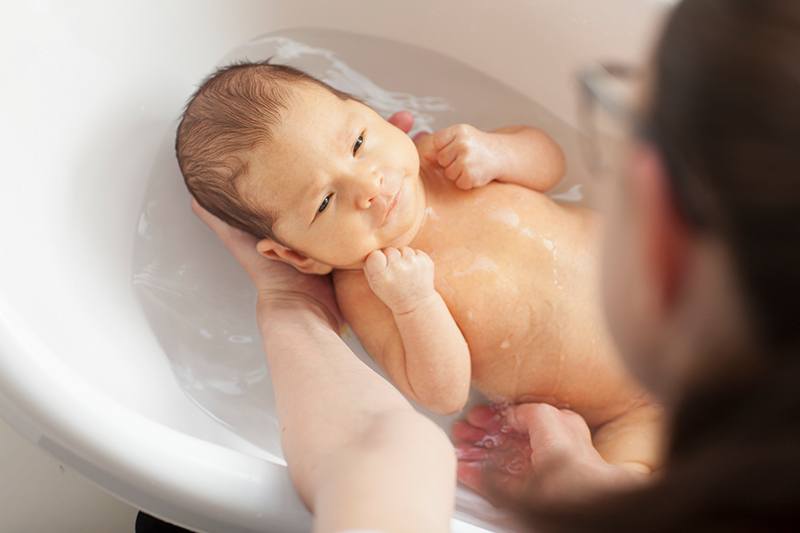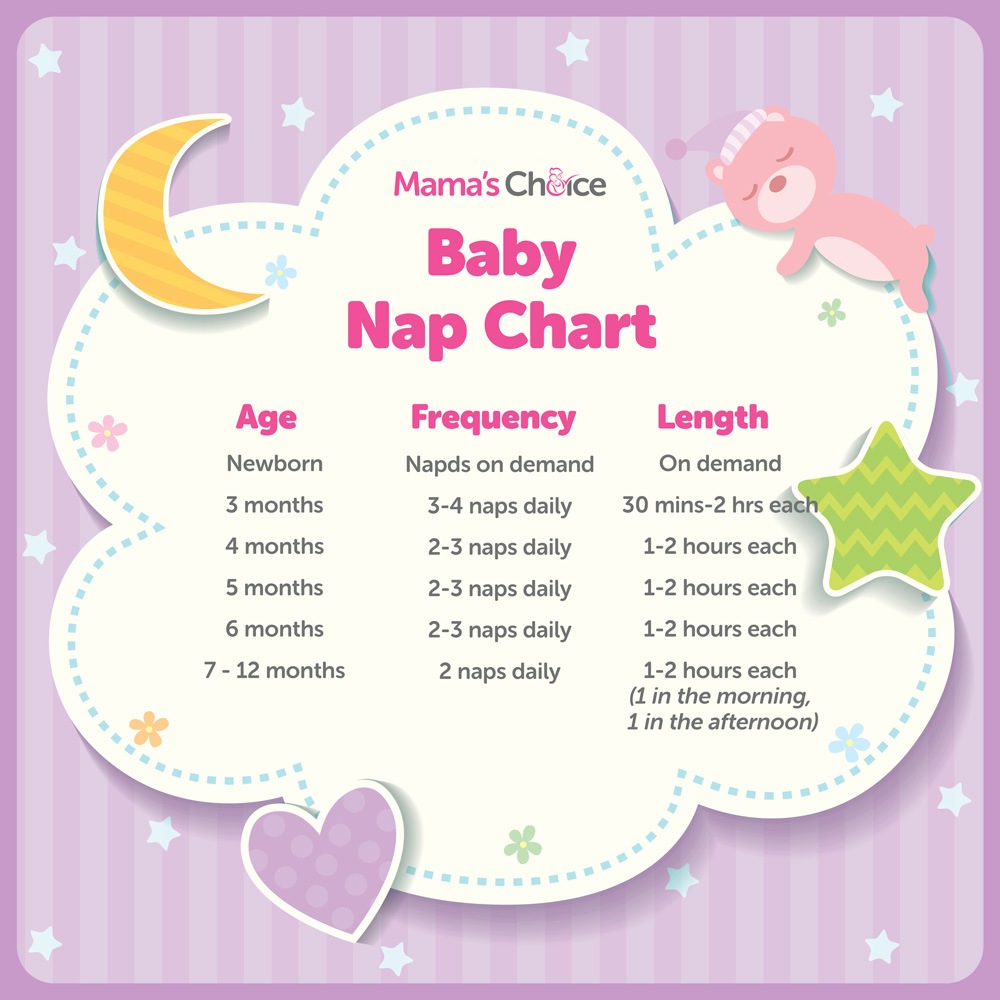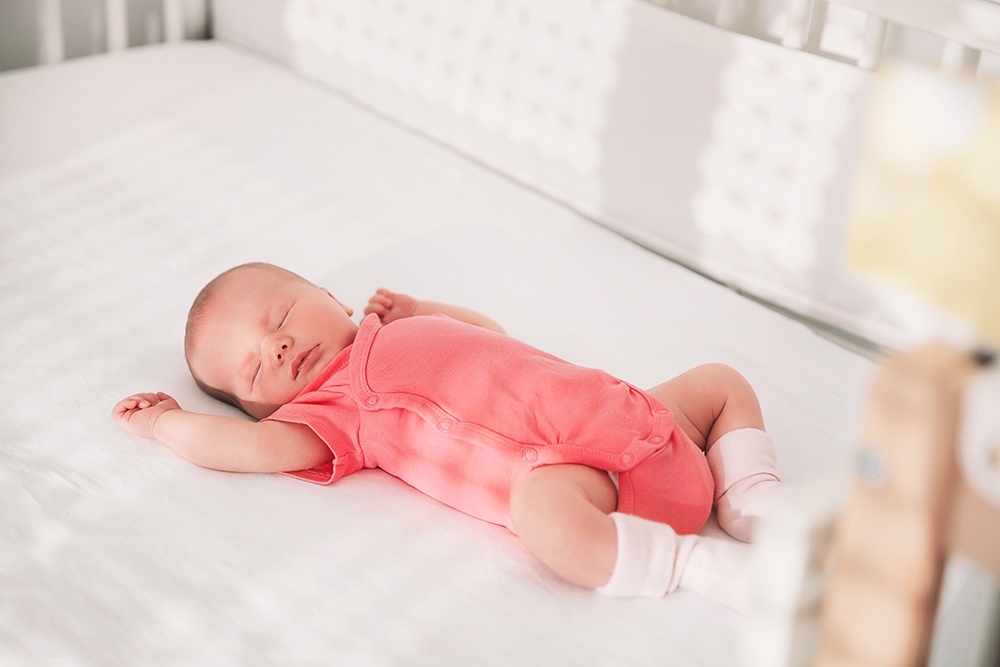Struggling to get your baby to sleep? Here are the best baby sleep tips perfect for new mamas!
Table of Contents
Why do babies need sleep?
How long should babies sleep?
How to create a safe sleep environment?
What happens if babies don’t get enough sleep?
What baby sleep tips work?
Skip ahead to any section you find the most interesting!
Being a mama is tough. There is the seemingly endless mess, the meals that need to be cooked for the family, the growing list of tasks you have at work, and more. But it’s especially difficult for new mamas who have yet to get used to the nonstop demands of motherhood.
And so in this article, we’re focusing on one aspect of motherhood that can truly help you, your baby, and your sanity — baby sleep tips that really work. As adults, sleep comes to us effortlessly (well, most of the time). All we need is a cool room, a cozy bed, and we’re bound to conk out quick. But with babies, it isn’t the case.
Why Do Babies Need Sleep?
In a scientific study published in 2017, it was revealed that infant sleep plays an important role in the cognitive and physical development of an infant . When your baby is sleeping, they’re not just recharging energy but also allowing their brains to absorb what they’ve learned and discovered in the day. Indeed, brain development happens when they’re asleep.
In an article published on Parents.com , director of sleep medicine at Children’s National Medical Center highlighted that growth hormone is “primarily secreted during deep sleep.” Hence, the reason why we sometimes notice our babies seem growing overnight!
Moreover, sleep also has an impact on their immune system . Jenni June , a certified sleep consultant who pioneered the practice of pediatric sleep hygiene, highlights that optimum, quality sleep “helps clear waste, toxins, and stress that builds up on the brain each day.” She explains further that with poor sleep, “the essential bacterial in their [babies] gut and colon have trouble digesting fiber and other vitamins and nutrients from their food.”
Whether or not an infant gets enough sleep is also a factor in childhood obesity . In a study of 915 children , they found out that infants who got less than 12 hours of sleep per day had twice the chances of being obese at 3 years old compared with those who slept for 12 hours or more.
How Long Should Babies Sleep?
The amount of sleep a baby needs varies depending on their age. Newborns, for instance, sleep the most at about 14 to 19 hours over a 24-hour period. But of course, a newborn’s sleep is typically short, waking every 1 to 2 hours to breastfeed or every 3 to 4 hours to bottle feed.
While most newborns will wake on their own, some newborns do sleep so well. According to Stanford Children’s Health , a newborn sleeping through the night should be woken up. But this wouldn’t be necessary once the baby shows weight gain.
Reading that newborns wake every 1 to 2 hours can be scary (when do you get to sleep, then?), but don’t worry mama, some babies start sleeping for as long as 6 to 8 hours at night when they are around 3 months old.
By 6 months, babies should be sleeping about 15 hours in the day and 9 to 11 hours at night. By the time your baby hits 1 year old, they would need 12 – 14 hours of sleep in a 24-hour period including one or two daytime naps.
Overwhelmed by all these details? Don’t worry, we’ve put together a simple visual guide to help you out, mama!
How To Create A Safe Sleep Environment?
Did you know that in the US, an estimated 3500 infants die each year because of sleep-related causes? Such is why a safe sleep environment is all the more important not just for quality sleep but to protect your baby as well. The American Academy of Pediatrics (AAP) recommends the following to ensure safe sleep:
- Babies sleep on their backs
- Use a firm sleep surface
- Do not place any loose, soft objects to minimize the risk of Sudden Infant Death Syndrome
- Share a room but do not share a bed; place babies in a separate crib, bassinet or play yard
What Happens If Babies Don’t Get Enough Sleep?
With such playing such a vital role in babies’ development, not getting enough sleep could spell a slew of daytime disasters for mamas. Irritability, crankiness, and increased stress are just some of the effects of lack of sleep. Thankfully, there are some tell-tale signs that can help you catch when your baby is not getting enough sleep:
- Loss of interest in people or toys
- Pulling ears or rubbing eyes
- Fluttering eyelids
- Yawning
- Looking away from stimulating things
- Becoming more clingy
What Baby Sleep Tips Work?
Now that we’ve covered the importance of sleep and how much sleep your baby should be getting, let’s get down to the nitty-gritty: baby sleep tips that really work. We’ve scoured every corner of the Internet, asked fellow mamas (and our respective mamas) about their tried-and-tested baby sleep tips that worked for them.
1. Use a white-noise machine.
White noise machines can be helpful in ensuring your baby gets a good night’s sleep. Its purpose is to mask sounds that would otherwise wake up a sleeping baby such as traffic sounds and household noises. Moreover, a study also found out that it helps babies fall asleep faster.
If you are keen to try this out for yourself, just make sure you have a machine that is no louder than 50 decibels. Any louder and you risk damaging your baby’s hearing. The AAP also recommends that you place it 7 feet away from the crib and that you stop playing it once your baby falls asleep, if possible.
2. Swaddle your baby
First, what is swaddling? It’s the practice of wrapping a baby up in a breathable blanket. This mimics the feeling they used to have inside your womb, where they felt snug and secure. As such, it helps them feel calm. Apart from this, swaddling helps minimize the startle reflex which often leads to premature walking.
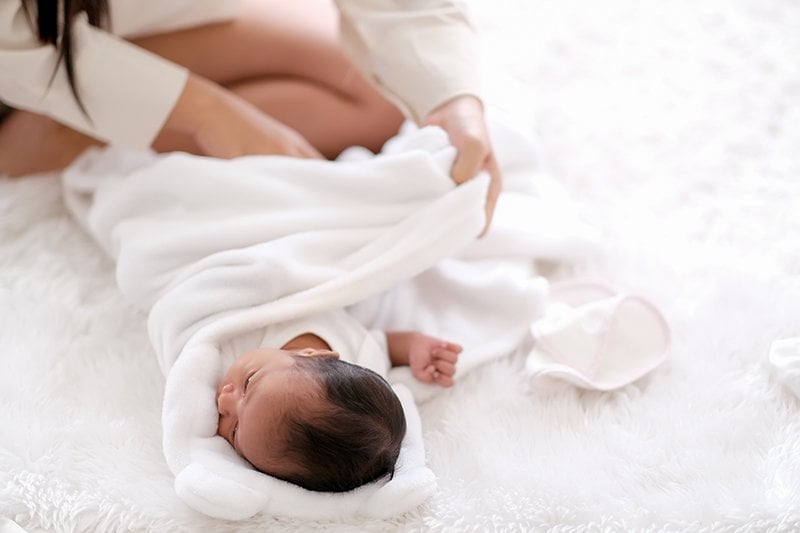
Did you know that a study revealed that babies who are swaddled in sleep get 1 to 3 hours more sleep compared with when they are not swaddled? If you are keen to try swaddling, just remember the following tips:
- Use a thin, breathable blanket
- Don’t wrap your baby’s neck or head
- Always put them on their backs to sleep
- Don’t swaddle too tightly that they are unable to move their hips or knees
- Once your baby is learning to roll over, stop swaddling
3. Keep your room cool
Notice how your baby seems to have a habit of kicking off their blankets? It’s because 68°F-72°F is the best and safest temperature for babies. It’s important that they do not overheat because at their age, they’re still unable to regulate their core body temperatures. And so in addition to keeping the baby’s nursery (or your own room if you are sharing a room) cool, avoid overdressing them too.
Certified sleep consultant Jenni June emphasizes this on her blog . “Yes, babies who are sleeping in warmer rooms will eventually crash,” but they won’t experience the “deeper, more restorative stages of sleep” that come with good quality sleep.
4. Give baby a warm bath before bedtime
As adults, we know firsthand how a warm bath can do wonders and help us relax after a long day. How does this work exactly? You see, a warm bath helps our bodies cool down and in turn help us feel drowsy and fall asleep.
It may seem counterintuitive how a warm bath cools down the body but there’s a scientific explanation behind it. You see, as the skin temperature increases during a warm bath, the blood vessels dilate and adjust blood circulation from the core of our bodies to our hands and feet. And what’s the best time to give a baby a bedtime bath ? One to two hours before bedtime.
In addition to the perfect timing and water temperature, consider using a bedtime baby wash. They’re usually enriched with ingredients that promote relaxation and good sleep, too.
5. Put the gadgets away
Mobile phones and tablets are indeed a modern marvel. These days, we use it to keep our little ones busy when we are desperate but they pose an incredible risk to babies. But apart from that, gadgets are also a hindrance to babies getting good, quality sleep.
Whether it’s the TV, a laptop, or a tablet, they should be turned off at least 30 minutes before bedtime. This is because they emit blue light, which can overstimulate the brain and make it more difficult for infants to fall asleep. Once you turn off all the devices, wind your baby down with soothing lullabies.
6. Avoid eye contact
It may be difficult not to look at your baby’s adorable face, but when you’re trying to get your baby to sleep, try very hard not to make eye contact. This is because eye contact is particularly stimulating for babies. The same goes for when your baby is sleeping and he/she suddenly wakes up. And when this happens, use a gentle voice to encourage your baby to go back to sleep while avoiding eye contact.
7. Limit daytime naps
For older babies, a consistent daytime nap schedule can help them sleep better at night. Typically, babies have two distinct napping styles. There are babies who nap for long stretches of hours while other babies nap for shorter hours say 30 minutes at a time. Think of them as a marathon napper and a sprint napper, mama.
Naps are essential for babies’ growth and development but you also have to make sure their daytime naps aren’t too late in the afternoon, as it may interfere with their nighttime sleep. When this happens, it may be time to adjust nap time. How often should your baby be awake in between naps? Let this be your guide, mama:
8. Dim the lights
Not all adults like sleeping in the dark, but did you know that babies actually find the dark comforting? Plus, it minimizes stimulation and helps your baby ease to sleep. Even better, the dark promotes the release of melatonin which, according to sleep experts , is a hormone crucial for a baby to sleep well.
9. Minimize diaper changes or be stealthy about it
This is one of the most common dilemmas of first-time mamas. Should or should you not change your baby’s diaper in the middle of the night while he/she is sleeping? For some mamas, they’ve overcome this little challenge by simply letting the baby sleep and changing in the morning instead (unless it’s completely soaked).
But of course, not without some measures to ensure their baby doesn’t get a rash. How are they doing it? By applying a generous amount of diaper rash cream to protect the baby’s bottom in case of nighttime wetting.
However, when your baby soils his/her diaper, you must change the diaper. To avoid waking up your baby, experts recommend using a wipe warmer or warm water to wash the bottom clean. It also helps to use onesies that lets you snap open the bottom part so you don’t have to jostle your baby too much during a diaper change.
The Takeaway
Indeed, sleep is more important than we think for our babies. Not only is it a way for them to recharge, but a way to maintain their health and well-being. While sleep isn’t always easy to come for babies, with the right combination of patience, persistence, and our baby sleep tips, we hope you find it easier to put your little one to bed.
Whether you’re preparing for the arrival of your little one or in need of baby sleep tips, one way to also help your baby get comfortable in bed is with a baby pillow. With Mama’s Choice Flat Head Prevention Pillow , not only are you getting the benefits of a pillow created with materials for utmost comfort but also one designed to help prevent flat head. Here are what moms say about the product:
It’s made of 100% organic memory foam, 3cm-thick breathable layers, and a concave contour designed to help maintain the natural shape of your baby’s head. Moreover, our pillow’s dense foam minimizes the risk of allergies and dust mites!
Shop for Mama’s Choice Flat Head Prevention Pillow on the official website. You can also add it to your cart via Shopee or Lazada.
Mama's Choice Team
The Mama's Choice PH team is composed of three Mamas who are dedicated to spoiling their little ones with lots of cuddles, playtime and the occasional sweets, of course. <3

